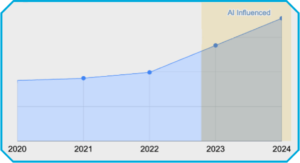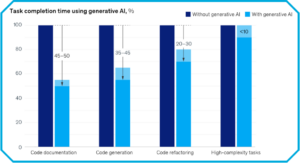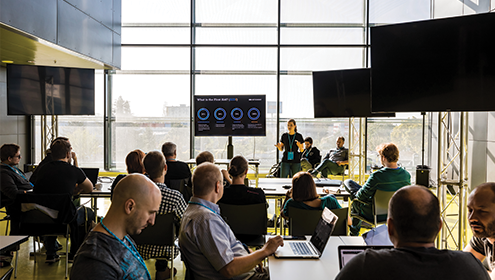
GenAI: Unpacking Promises and Risks for Software Development Jobs

Innovation has always been a driving force in the technology industry, but its latest development looks set to transform the whole IT sector. Of course, we’re talking about the rise of generative AI.
While the potential of the technology looks unlimited, many people working in the industry are caught between excitement and fear. Software developers specifically are enthusiastic about genAI transforming their jobs for the better; but on the other hand, they worry it may one day become so advanced that it replaces them.
According to Gartner, by 2027 one in two software developers software developer in the enterprise environment will be using generative AI tools to develop, test, and operate software – compared to only 5% who are using such tools today. This increase will have significant impacts on organizations’ business models.
While we have previously explored the risks of generative AI for businesses (and highlighted strategies to mitigate them), our focus in this article is on showing how generative AI can serve as a valuable tool for software developers rather than a substitute.
In this blog, we will explore:
- benefits of generative AI for software developers
- can generative AI replace software development jobs
- NETCONOMY’S view of generative AI
- how NETCONOMY builds knowledge around generative AI
Benefits of Generative AI for Software Developers
Generative AI is changing the way software is made by leveraging advanced algorithms and machine learning models. But is it the power tool developers hope it would be?
Here is an overview of the main benefits.
Automation of Repetitive Development Tasks
One of the primary benefits of generative AI for software developers lies in its capacity to automate repetitive tasks, making their work quicker and more efficient.
By automating repeating tasks like the creation of user interfaces, tests, and guides, developers have more time to work on more complex and creative aspects of software development.
According to KPMG, this technology can reduce the time needed to create simple code by as much as 90%, which makes products available faster and lets companies use their resources better while still providing great results.
Software developers can also use genAI to increase their productivity in other ways:
- Explain code functionality: If code generated by others needs to be reworked or improved, genAI can help software developers understand what it does.
- Simplify code: Maintaining code in the future becomes simpler as genAI can recommend more straightforward options to make the code easier to understand.
- Automate the documentation of user stories.
- Speed up debugging processes through automated tests.
Improved Accuracy in Coding
Generative AI could significantly improve software development by reducing mistakes and increasing accuracy.
For example, it can create comprehensive architecture diagrams from a given set of inputs or specifications, ensuring seamless integration of all system components.
The models can also improve the consistency of code through automated refactoring or style changes.
Furthermore, generative AI tools can review code, highlight bugs, and help developers code more cleanly and efficiently, which is crucial in maintaining high-quality software development standards.
By automating these processes, generative AI lessens the risks of failures, decreasing expensive downtime and preventing data loss.
More Personalized Experiences
There are many business use cases for generative AI, but one that is often mentioned is personalized customer experiences. This also translates to software development, as it allows teams to create products and services that can adapt to users’ preferences and needs. In other words, these products and services can learn from the user and improve over time.
This can be seen in the rising number of chatbots that are beginning to populate company websites. While these chatbots are currently often vulnerable to errors and false output, we expect that technological development and further industry progress will lead to significant improvements, which will save companies – and the developers – significant time and resources that would be spent hiring customer support teams.
Therefore, the answer is yes, generative AI can be a powerful tool for software developers. However, we need to be clear that although these improvements are theoretically possible, they are not yet fully applicable in practice.
Look at the example of GitHub’s CoPilot. A study conducted by GitHub shows that developers using this tool completed software-related tasks 55% faster than those who didn’t. However, a recent study by GitClear reports that there was a negative effect on code quality when using CoPilot.
The research showed a “significant uptick in Code Churn and a concerning decrease in ‘code reuse’. This leads us to the conclusion that code can be produced much faster than before, but that the tool itself is not enough to fulfill the job of a software developer.
Professionals need to examine and clean up the AI-generated code before it can be used for production – forging a new connection between AI tools and the human workforce.

Source: Coude Code Churn by year, GitClear
Another study by McKinsey showed that while generative AI can increase development speed, the completion time increases with the complexity of tasks. In fact, time savings decreased to less than 10% on tasks that developers considered highly complex due to, for example, their lack of familiarity with a necessary programming framework.

Source: Task Completion Time using Generative AI in %, McKinsey & Company
These findings raise the following question.
Can GenAI Really Replace Software Developers?
Although research into the capabilities of generative AI is still ongoing, many within the industry worry that their jobs will be at risk in the near future. After all, if AI will be able to analyze data, generate code, manage customer support, and even create reports, what will happen to the human workforce?
Forrester, an IT research company, highlighted the expanding usage of AI and automation across the US in its 2023 Generative AI Jobs Impact Forecast. However, the expansion of AI doesn’t equate to direct job losses, and all forms of automation are set to influence the future of work even more broadly.
“We forecasted the future impacts of generative AI and found significant influence — that is, generative AI will reshape how many jobs operate and how work gets done. But job losses will be lower than many expect, and influence will far outweigh job cannibalization,” a Forrester spokesman said.
While it is true that certain aspects of an IT developer’s job may become automated, it is important to remember that artificial intelligence can’t grasp the nuances of context and creative work.
Therefore, while machines may be able to handle repetitive and routine tasks, human creativity and expertise will still be necessary for developing complex solutions and strategies. In fact, some argue that the role of software engineers may become even more valuable as they will be needed to develop, manage, and maintain these AI systems.
Lareina Yee, chair of the McKinsey Technology Council, suggests that the shortage of software developers will continue well into the future, but that generative AI will help reduce some of the impacts of that shortage on companies.
The findings of the McKinsey survey mentioned in the previous chapter, highlight that the technology is best used to augment developers, as they needed to iterate with the tools several times to achieve quality outcomes and prompt the tool for the right output.
Based on research findings and participants feedback, their research revealed three areas in which human involvement and oversight are still crucial:
- Examining code for bugs and errors: When examining code for bugs and errors, generative AI-based tools occasionally gave incorrect coding recommendations and introduced errors in the code.
- Contributing organizational context: While generative AI–based tools can generate code, they are not aware of the specific needs of a project and organization. This knowledge is crucial to ensure that the final software product seamlessly integrates with other applications, meets performance and security requirements, and ultimately addresses the needs of end-users.
- Navigating challenging coding requirements: Generative AI tools are more effective in addressing straightforward prompts, such as optimizing a code snippet, rather than complex ones that involve combining multiple frameworks with different code logic.
NETCONOMY’S View of GenAI: Augmentation, Not Replacement
With a team of 500 people, of which the majority are software developers, it was important for us to investigate the predictions around AI in the industry on our own. We are eager to understand the potential impact on our business and how it will transform the roles and responsibilities of our employees.
Therefore, our internal technical enablement team (TET) performed comprehensive market research around genAI tools that were launched in previous months. All of these tools offered bold claims – including replacing software developers, and saving companies lots of resources and money – and we wanted to see how they match those promises.
The first tool our TET team investigated was the already mentioned Github CoPilot. Specifically, they wanted to see how it performed when assisting in writing code. Although the test phase is still running, our first evaluations align with the findings of GitClear’s study: The tool is great for supporting software developers, but it is far from replacing the expertise and experience of skilled individuals in the field.
Here is what Max, Head of our technical enablement team, draws from the research:

Another project is around building a bot based on VERTEX AI, a platform created by Google. The aim of this bot is to give hints to our developers on where to focus when reviewing code.
Again, this should only serve as a an augmentation tool for our people, and not as a stand-alone service that can take over software development, and our team will review the outcome once the test phase is over.
In most of these pilot projects, our people were confronted with the standard risks that AI poses for companies, such as hallucinations, bias or data security concerns (In this article, our genAI experts provide advice and first-hand experience on how you can manage these risks). This served us further proof that people always need to be involved to ensure a safe, secure and productive use of generative AI.
Knowledge-Building around GenAI at NETCONOMY
In line with our market research on genAI development tools, NETCADEMY, our training department, is currently evaluating trainings and certificates offered by external providers to incorporate them into our standard training catalog.
One training course that all employees are offered is the Machine Learning Specialization course by Andrew NG, which includes further specialization opportunities. To address security concerns, our information security department offers comprehensive AI compliance training that is designed to educate our employees on the responsible use of AI tools, ensuring their proficiency in this field.
However, the focus of our technical trainers is currently on creating and building up a dynamic internal knowledge hub that can be fed by all employees to explore the topic of GenAI more thoroughly.
The knowledge hub includes:
- a public slack channel for all employees to share interesting articles and blog posts, training opportunities, and other useful links
- a confluence space that documents all resources, including books, papers, courses, videos, and podcasts
- regular documented discussion rounds, mostly driven by employees who researched interesting use cases and want to discuss them with a broader round
Mario is one of our technical trainers and drives the topic of knowledge-building around GenAI:

Final Thoughts on Generative AI for Software Developers
As it stands, we believe the rise of generative AI will bring a change in the way software developers work, how products and software are made, and how we interact with them. Even though this change will bring a lot of opportunities for developers, there will be a great focus on companies to ensure their people are not pushed out of the equation.
If you want to secure a strong position in the job market within the realm of AI, join our machine learning team and play a crucial role in driving innovation and implementing cutting-edge machine learning solutions for well-known brands. Find our current job offers here.
Authors and Contributors






